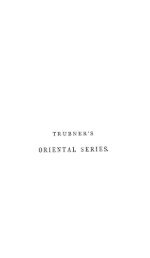Untitled
Untitled
Untitled
You also want an ePaper? Increase the reach of your titles
YUMPU automatically turns print PDFs into web optimized ePapers that Google loves.
NOTE XXVI. ON THE PULSE i<br />
><br />
.<br />
141<br />
(3) The time or duration of each movement (zamdnu kulli harakat<br />
in<br />
, "quod ex tempore cujuscunque motionis sumptum est"), This<br />
also comprises<br />
1* three<br />
varieties, the quick (sari\ "velox'"), the>slow,<br />
(bati\ " '<br />
tardus "), and the intermediate (" aequalis "). a<br />
(4) Resistance to the tpuch (qiwdmu'l-dfyt, " quod ex essentia instrumenti<br />
sumitur "). Here als*o we have three varieties, thte soft (layyin,<br />
" "<br />
mollis "), the hard (salb, durus ") and the intermediate (" mediocrte ").<br />
{5) Emptiness or fulness (hdlu md yahtawi 'a/ay/ii min khaldihi wa<br />
'mtild'ihi, "quod est sumptum ex eo quod continetur "), three varieties,<br />
the* full (mumtali\ "plenus"), the empty (khdli, "vacuus") and the<br />
intermediate (" mediocris ").<br />
(6) Heat or cold (harru malmasihi wa barduhu, "quod ex suo tactu<br />
sumptum est *), three "<br />
varieties, the hot (hdrr, calidus "), the cold<br />
(bdrid, " frigidus ") and the intermediate (" temperatus ").<br />
(7) The duration of the pause (zamdnu' s-sukun, "quod est sumptum<br />
ex tempore quietis "), three varieties, the continuous (mutawdtir, also<br />
called mutaddrik and mutakdthif, "frequens," "consequens" or "spissus"),<br />
the differentiated (mutajdwit, also called mutardkhi and mutakhalkhil,<br />
"rams," "lassus" or "resolutus"), and the intermediate ("mediocris").<br />
(8) The equality or diversity of the pulse (istiwd'u'n-nabdi wa<br />
'khtildfuhu, "quod est sumptum ex aequalitate et diversitate," "aut aequale,<br />
aut diversum seu inaequale"), two varieties, equal (mustaw, "aequalis")<br />
and unequal (mukhtalif, " diversus ").<br />
,,(9) The regularity or irregularity of the pulse (an-nizdm wa ghayru'nnizdm,<br />
" genus quod ex ordinatione et inordinatione sumptum est "),<br />
two varieties, regularly different (mukhtalif muntazim, " diverse ordinatus")<br />
and irregularly different (mukhtalif ghayru muntazim, "diverse<br />
inordinatus ").<br />
'<br />
(10) Weight, harmony or measure (wazn, " quod ex pondere est<br />
sumptum "), which may be either good or bad, each of which comprises<br />
three varieties.<br />
It will thus be seen that 37 primary varieties of pulse are recognized,<br />
bu*> there are man? secondary and composite types which it would take<br />
too loflg to enumerate. Speaking of the latter in the first group or geniB<br />
mentioned above Avicenna says that some only are named, such as<br />
j<br />
al-'azim (' 'magnus") and as-saghir ("parvus"), al-ghaltz ("grossus")<br />
and ar-raqiq (" subtilis :<br />
') ; and the next section but one ( iii) treats of<br />
the different sorts of composite pulse which have proper na.mes, such as<br />
'<br />
al-ghazdli ("gazellanV), a/-wazey'/("undosus "), a^-^///("vermiculosus"),<br />
an-namli (" formicans "),><br />
etc. Very full treatment is accorded to the<br />
whole subject, and in it particular is explained why the pulse is felt at<br />
, the wrist' preferably to any other place, and what precautions should<br />
be observed in it. feeling The remarks about the observing of the<br />
systole ascribed by our author to Avicenna appear to be really quoted<br />
by him from<br />
" '<br />
Galen : Galenus quoque dixit longo tempore non' fui<br />
sollioitus ex : depressione postea vero non quievi tangendo doifec ex eo<br />
aliquid percepi, et postea illud complevi. Nam postea portae pulsus mihi<br />
apertae fuerunt '."<br />
,<br />
I<br />
.<br />
'<br />
'








![La religione di Zarathustra nella storia religiosa dell' Iran [microform]..](https://img.yumpu.com/15970820/1/151x260/la-religione-di-zarathustra-nella-storia-religiosa-dell-iran-microform.jpg?quality=85)


